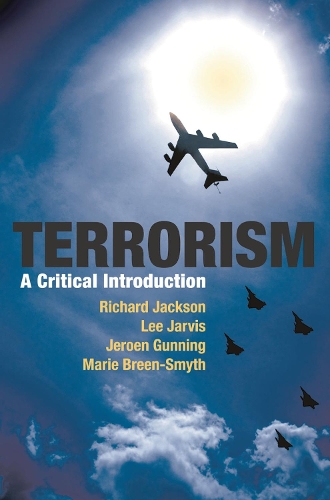
Terrorism: A Critical Introduction
(Hardback)
Available Formats
Publishing Details
Terrorism: A Critical Introduction
By (Author) Richard Jackson
By (author) Lee Jarvis
By (author) Jeroen Gunning
By (author) Marie Breen-Smyth
Bloomsbury Publishing PLC
Red Globe Press
26th April 2011
United Kingdom
Classifications
Tertiary Education
Non Fiction
Arms negotiation and control
303.625
Winner of Choice Magazine Outstanding Reference/Academic Book Award 2012
Physical Properties
Hardback
304
Width 156mm, Height 234mm
671g
Description
This innovative text provides a much-needed critical introduction to terrorism. Cutting-edge research on contemporary issues is combined with new insights into long-debated issues such as the definition of terrorism, the nature of the terrorist threat and counter-terrorism strategies. Showing that the methods we adopt as well as the material we study are vital for a clear understanding of the subject, this text goes beyond traditional IR approaches to rethink popular beliefs and assumptions about terrorism. Taking a genuinely global and integrated approach, this book is an ideal entry into the study of terrorism. In the years since 9/11, terrorism has been transformed into an issue of global significance. Terrorism and the war on terror has affected virtually every aspect of modern life, and a precise understanding of terrorism is now more important - and contentious - than ever. This text examines the origins, perceptions of, and responses to, terrorism and counter-terrorism in the contemporary world. It takes into account recent developments on the world stage as well as within - and in response to - critical terrorism studies. This text is the ultimate companion for students studying terrorism as part of an undergraduate or postgraduate degree. It guides students step-by-step to have a deeper understanding of terrorism and a more nuanced approach to their studies.
Reviews
'A superb critical introduction to both the field of terrorism research and to our understanding of the phenomena associated with terrorism. Wide ranging, well written and pitched to the student audience, it is easily the best introduction to the subject.' -Michael Stohl, University of California, USA 'An admirably organised and comprehensive volume which provides a critical approach with which all serious students of terrorism must engage - whether they agree with it or not. This research-based text is an important addition to teaching materials on a vital area of public policy.' - Ken Booth, Aberystwyth University, UK 'Refreshing and wide-ranging, this is a long-overdue and valuable addition to the literature.' - Ruth Blakeley, University of Kent, UK 'A sustained breeze of fresh air focused on a subject-or obsession-that desperately needs it.' - John Mueller, Ohio State University, USA 'Here at last is the much-needed textbook that critically dissects terrorism's myths and realities from a critical perspective. Intellectually sophisticated, it is based on the most up-to-date tools of current scholarship.' - Joseba Zulaika, University of Nevada, USA '[A]n innovative book that is designed to change how we teach and research terrorism... [it] brings a fresh and well-developed alternative to the traditional literature... A great strength of the book is the way in which it challenges academics writing in this field to be reflective about their analytical categories and normative commitments.' - Tim Dunne, International Affairs '[T]he authors have very successfully achieved their goal of broadening and deepening the field of terrorism studies, providing an important resource and stimulus for further critical engagement with the theoretical and empirical issues related to terrorism.' - Kathryn Fisher, Millennium 'Over the last decade, a number of very good books on the study of terrorism have come to the fore. However, the current entry by Jackson et al. is at the very top of the list in terms of comprehensiveness and usefulness... [T]his authoritative book provides incredible insight into and analysis of both the myths and the realities surrounding terrorism-from early days to the present. In short, this book's scope, focus, and critical assessment are long overdue in the literature.' - W. Jakub, CHOICE
Author Bio
RICHARD JACKSON is Deputy Director at the National Centre for Peace and Conflict Studies, University of Otago, New Zealand. LEE JARVIS is a Lecturer in Politics and International Relations, Swansea University, UK. JEROEN GUNNING is a Reader in Middle East Politics and Conflict Studies, Durham University, UK. He was founder and deputy director of the Centre for the Study of 'Radicalisation' and Contemporary Political Violence (CSRV) at Aberyswyth University from 2005-2010. MARIE BREEN-SMYTH is Professor in International Politics, University of Surrey, UK. She was founder and deputy director of the Centre for the Study of 'Radicalisation' and Contemporary Political Violence (CSRV) at Aberyswyth University from 2005-2010.
